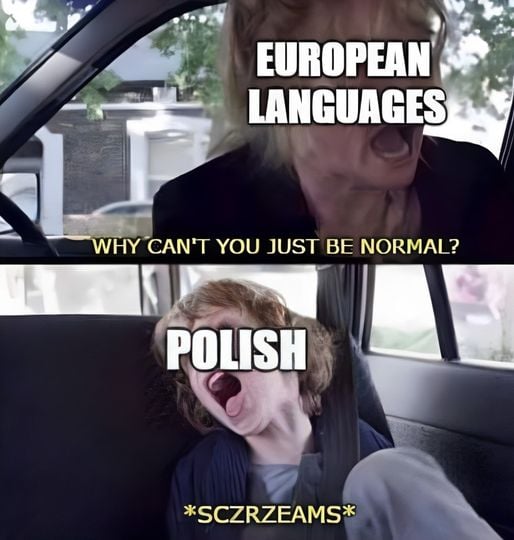this post was submitted on 24 Oct 2024
983 points (98.4% liked)
memes
10844 readers
3792 users here now
Community rules
1. Be civil
No trolling, bigotry or other insulting / annoying behaviour
2. No politics
This is non-politics community. For political memes please go to [email protected]
3. No recent reposts
Check for reposts when posting a meme, you can only repost after 1 month
4. No bots
No bots without the express approval of the mods or the admins
5. No Spam/Ads
No advertisements or spam. This is an instance rule and the only way to live.
Sister communities
- [email protected] : Star Trek memes, chat and shitposts
- [email protected] : Lemmy Shitposts, anything and everything goes.
- [email protected] : Linux themed memes
- [email protected] : for those who love comic stories.
founded 2 years ago
MODERATORS
you are viewing a single comment's thread
view the rest of the comments
view the rest of the comments

I'm learning Polish, and spelling (rz dz sz cz ł and ą ę ż ś) is all fine for me-- the thing I struggle with is the grammatical cases. The fact that the ending of everything changes is what has caused me to give up twice 🥺
I will pick it up again, but I sucked at the Masculine/Feminine thing with French, and this is a lot more difficult.
CAT:
Przepraszam moja drogi!!
Looks weired but a sound of C and T has to be somehow connected, at least it feels like they are to me. Based on my experience, sound of Polish Ć and Czech Ť are transitional between Polish/Czech T/C. Proper linguist might put some more light on it than just my speculation.
Our C is reffered in IPA as joined "TS" sound, so there is definitely some merit to that
Polish C is also described as /t͡s/ (e.g. co /t͡sɔ/). According to wiki both are dental and voiceless although one is plosive and the other affricate. As I've read their descriptions on wiki, they made a lot of sense - /t͡s/ starts with a blockade of airway (just as /t/) but the air is released slightly differently thus making the difference in sound produced.
The T turning into C is called somehow, I don't remember how, but it's used quite often. For example, "expensive" and "more expensive" would be "drogo" and "drożej". I think there were even some tables for all the transformations, but I might misremember things